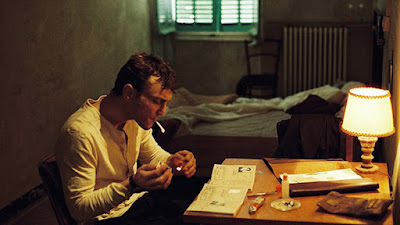Christian Petzold is getting a lot of airplay on #mubi at the moment, and rightly so too; his films have the quality of a fever dream: urgent, political punctuated with moments of languid poetry to bring it all together. I saw Barbara (2012) and Phoenix (2014) at festivals on the big screen years ago and their stories and images have stayed with me to this day. The brilliant Nina Hoss worked with Petzold across five of his films. 
Christian Petzold
In Transit, Petzold pairs Franz Rogowski - whom you may remember from Haneke’s Happy End (2017) as the patriarch's somewhat wayward son - with the wonderful Paula Beer as Marie. Beer possesses a haunting quality which she brings to almost all her roles, she’s both fragile and tender and yet, resilient and strong; think Ozon’s Frantz (2016) my review of it is here; or Henckel von Donnersmarck’s Never Look Away (2018).

Rogowski's character reminded me of Antonioni’s
The Passenger
Rogowski is Georg, a political refugee who was looking for a passage out of a besieged Paris. He agreed to deliver a letter to a famous leftist writer, before he soon realised the writer had taken his own life. Before leaving the hotel where the writer was staying; Georg decided to keep the letter (from the writer’s wife), his last manuscript, passport and other documents including a letter from the Mexican consulate offering a safe passage to Mexico from Marseille. Georg decides to travel there. Once at the seaport, a woman who was unknown to him approaches him; mistaking Georg for another man. They exchange glances but the moment passes. This happens again outside the Mexican consulate. The woman is Marie. The two seem to pass each other as ghosts do: seen but not really seeing each other. Days drag on, Georg takes on the identity of the writer, or does he? Perhaps he has become a kind of substitute instead; for a boy whose father died in Georg’s company, a companion for Marie’s lover, Richard, who is a kindly doctor; and for Marie too. When in transit, one learns that there are no coincidences, and friendships can’t help but grow.
Identity and truth. The reason for loving someone needs neither of these things. And perhaps that’s why Petzold’s film is so affecting.
Although based on Anna Segher’s novel, which was set in Nazi Germany, Petzold’s sombre and sensitve film is set in the present day; it’s a story that resonates without the need for any period references.
Naomi Kawase’s film Radiance is also a sombre and evenly-paced tale of shared love and respect for another person. I recognised the handsome face of Masatoshi Nagase straight away, but it took almost the entire film before I was able to place him; as the young Japanese protagonist in both the 1995 film Cold Fever (Friðrik Þór Friðriksson, one of my favourite films during the 90s) and also in Jarmusch’s Mystery Train (1989).

To see the world, to frame the world
Ayame Misaki is Misako, a translator of films for the vision impaired, where she translates not the dialogue but the mise-en-scène. Her voiceover heard over the screening of a film describes the scene, the setting, the actor’s gestures too, to create the mood that is imparted in the film. Currently she is working on a film about an elderly husband and wife and the wife’s departure from the world. Her work requires patience as well as the ability to take on criticisms from a panel of men and women who are blind. One of the panelists is a famous vision-impaired photographer Masaya Nakamori played by Nagase.

Evocative story of friendship and love,
Misaki and Nagase make an unlikely pair
Masaya is struggling with his depleting eye sight; he is reserved but cutting when he speaks. We see him working on some computer coding through a screen and magnifying devices, the codes are displayed in the largest font size possible (think 200+ pt) and each character is voiced by the computer as he types it onto his keypad. (I would have thought this a difficult way to work, but he had obviously adapted). It seems that Masaya likes to see the world through his other eye - that of the camera lens; it is as though the world can only be viewed through the eye of another; not because his own eyes fail him, but this other eye frames the world, (perhaps his internal world too) so that it becomes manageable, able to be understood. Nagase plays his character so convincingly that you don’t doubt that he was in fact, blind.
Juxtaposed with Misaki’s Misako, who has a purity of spirit, Misaki has a beautiful face too, which lights up the screen with each close-up. The unlikely pair discover a shared language and become friends.

The moment before twilight; before the
light fades into darkness.
The dance of friendship between these two main characters is one of beauty; as it speaks of the play between the seen and the unseen. Kawase’s film explores the essence of things, what should be named and what should be left unsaid. And how the ‘spirit’ of a person or a thing emerges, evoked by the partially-sighted that a full-sighted person may take for granted. These moments are alluring, lyrical, song-like.
Transit is currently showing on SBS on Demand and Radiance is available on Mubi.

No comments:
Post a Comment
Note: only a member of this blog may post a comment.